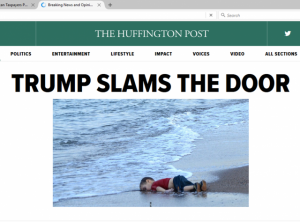- Joined
- Mar 2, 2013
- Messages
- 6,328
I didn't want to send another discussion off topic, and felt this topic warranted its own thread. Hopefully this can be a productive discussion on navigating the "media" cesspool.
What sparked this topic (not to appear 'picking' on Erica; this isn't about the "right" or "left"):
Fox isn't the only guilty culprit. HuffPo - for example, and frequently cited by many on the left - is 'on par' with Fox (per the chart Kath shared) with regard to slanted news.
Chart (halfway down): [URL='https://www.pricescope.com/community/threads/march-organizer-might-have-had-terrorist-ties.228237/']https://www.pricescope.com/community/threads/march-organizer-might-have-had-terrorist-ties.228237/[/URL]
HuffPo's main page is plastered with not only a dozen specific anti-Chump stories, but a slew of others that take a direct negative aim at those on the right, And several other fear-mongering pieces feeding liberals' 'thirst for blood'.
But enough about politics & slant.
The problem with both (any so many others) is that a lot of the articles you read are not really "news"; they're editorials (opinion pieces). The article Ruby cited (teacher shooting Trump) is an editorial - the views & opinions by that writer. Years ago, most news outlets hosted a couple editorials in their publications for variety, perspective, etc. Now, they dominate the various outlets (tv, websites, even print).
A "news" story (intended to relay timely facts about an event or topic) should contain four key items in the first paragraph/sentence: who, what, when, where; the "what" & "why" usually immediately follow it, and it should never contain the words "I" or "me" (clues you're reading an opinion piece). Anything else will generally fall into either the editorial realm or be considered a "feature" story (human/general interest type stuff, how someone conquered a great feat, etc).
The face of news (generally speaking) has changed so much over the last two decades. Now, thanks to the Internet, 24-hour news cycle, and social media, most of what we see/read is opinion and not really "news". EVERYONE who can form a complete sentence considers themselves a journalist (albeit sometimes masked as a "contributor"). And they (they media) don't do a very good job of making it clear which type of article they are pushing on viewers/readers.
You (collectively) have to decipher the difference not only in the individual articles you read, but the overall credibility and mission of the 'media outlet' that airs/publishes it. I think society needs more features about people and the good they "do", and less editorials about what people "think".
What sparked this topic (not to appear 'picking' on Erica; this isn't about the "right" or "left"):
ericad|1485499139|4120521 said:But then again, faux news, so of course this one loon will be trotted out to instill fear in the hearts of all conservatives.
Fox isn't the only guilty culprit. HuffPo - for example, and frequently cited by many on the left - is 'on par' with Fox (per the chart Kath shared) with regard to slanted news.
Chart (halfway down): [URL='https://www.pricescope.com/community/threads/march-organizer-might-have-had-terrorist-ties.228237/']https://www.pricescope.com/community/threads/march-organizer-might-have-had-terrorist-ties.228237/[/URL]
HuffPo's main page is plastered with not only a dozen specific anti-Chump stories, but a slew of others that take a direct negative aim at those on the right, And several other fear-mongering pieces feeding liberals' 'thirst for blood'.
But enough about politics & slant.
The problem with both (any so many others) is that a lot of the articles you read are not really "news"; they're editorials (opinion pieces). The article Ruby cited (teacher shooting Trump) is an editorial - the views & opinions by that writer. Years ago, most news outlets hosted a couple editorials in their publications for variety, perspective, etc. Now, they dominate the various outlets (tv, websites, even print).
A "news" story (intended to relay timely facts about an event or topic) should contain four key items in the first paragraph/sentence: who, what, when, where; the "what" & "why" usually immediately follow it, and it should never contain the words "I" or "me" (clues you're reading an opinion piece). Anything else will generally fall into either the editorial realm or be considered a "feature" story (human/general interest type stuff, how someone conquered a great feat, etc).
The face of news (generally speaking) has changed so much over the last two decades. Now, thanks to the Internet, 24-hour news cycle, and social media, most of what we see/read is opinion and not really "news". EVERYONE who can form a complete sentence considers themselves a journalist (albeit sometimes masked as a "contributor"). And they (they media) don't do a very good job of making it clear which type of article they are pushing on viewers/readers.
You (collectively) have to decipher the difference not only in the individual articles you read, but the overall credibility and mission of the 'media outlet' that airs/publishes it. I think society needs more features about people and the good they "do", and less editorials about what people "think".










300x240.png)